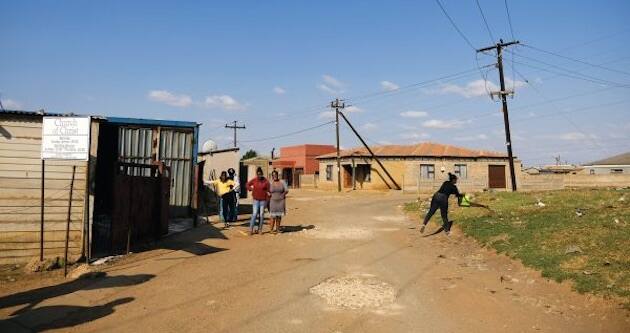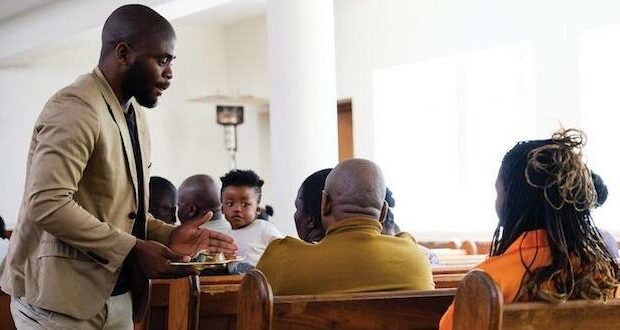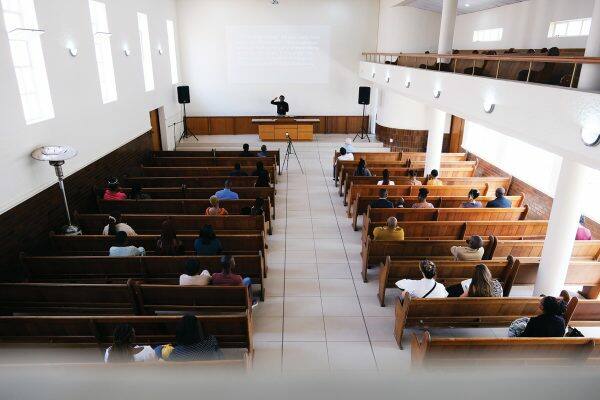BENONI, South Africa — Merchants gathered at a busy intersection in this Johannesburg suburb in 2020 to sell a variety of goods ranging from food to tires.
Among the sellers were unemployed locals, families of illegal miners and a minister for the Tshiawelo Church of Christ.
The congregation had employed Songezo Gwanya, a 2017 graduate of Southern Africa Bible College, for two years when the pandemic hit. While the country’s inflation rate rose, his salary of $445 per month remained stagnant.
To feed his family, Gwanya joined other men and women on the dirt lot beside the busy streets, selling homemade atchar, a spicy condiment made from preserved mango.
A year later the Tshiawelo elders demoted him from full-time ministry for working a secular job. He had become a buyer for car lots to supplement his income.
“My heart has always been to preach the Word,” Gwanya said. “That is it. I never envisioned myself buying cars, selling atchar, doing a brand or whatever. I do all these things out of desperation. What can I do?”
Losing good ministers
For South African preachers, salary often comes with stigma.
Many of the country’s first Churches of Christ were planted by missionaries — who also served as their first ministers, supported only by sponsoring churches in the U.S. As these churches transitioned from mission work to independent congregations, missionaries were hesitant to stress the importance of financially supporting future ministers.
“A lot of American missionaries that came over were dealing with very, very poor people, so they were reluctant to teach a great deal about giving,” said Chris Burke, minister for the Hilltop Church of Christ in Johannesburg. “The early missionaries did a fantastic job of laying the foundation for the church in South Africa. … But the one area that, understandably, they were a little bit wary of was tithing because of their wealth compared to the average member.”
But collecting funds from a congregation is more challenging than just reducing stigmas.
Nearly 33% of the country’s estimated 60 million citizens were unemployed in 2022, according to the government agency Statistics South Africa. Bloomberg ranked the jobless rate amongst the highest globally. Many of those who are employed spend up to 75% of their monthly pay on debt, reported BusinessTech, the largest business news website in South Africa.
Given the country’s financial state, it takes an established congregation to support a full-time minister. But it often requires a full-time minister to build a congregation.
Only about 25% of Southern Africa Bible College’s graduates find work in full-time ministry despite 75% intending to do so, dean of students Edward Nkosi said.
“We lose lots of good ministers of the Word, evangelists, because the church can’t support them,” Nkosi said. “They’re not here to pursue a degree with the hope that they will do part-time evangelism, but they end up being somehow absorbed by secular work and doing nothing for the church.

A woman tosses wastewater into the field across from Zenzele Church of Christ. The church building is a single room constructed with tin, concrete and wood.
“It’s daunting, feeling like if they go into full-time ministry, they’ll go back to poverty.”
A man collects the tithe from members of the Hilltop Church of Christ. Photo by Audrey Jackson.
Supplemental support and foreign funds
To help struggling Bible college graduates, the Hilltop church started a graduate intern program in 2017.
Southern Africa Bible College distributes the yearly scholarship of about $5,000 to eligible graduates. Graduates can apply for the scholarship every year until external support is deemed no longer necessary.
The program, funded by several South African and American congregations and individuals, raised $70,000 in 2022. The funds helped support 11 graduates, including Gwanya.
The graduates’ challenge is to persuade congregations to become financially autonomous. Outside funds — especially from Christians in the U.S. — can make church leaders reluctant to invest in their ministers.
Nkosi has negotiated with more than one church about salaries on behalf of the Bible college graduates. Oftentimes, he said he has to remind them that it is the elders’ responsibility to look after the minister — not that of the college and American churches.
“American checks, of course, may help for that period of time,” he added. “But it’s still their responsibility.”
The effects of dependency on American donations concern Kirk Eason, director of U.S. development for Southern Africa Bible College.
“The last thing we want to do is make the same mistake that we’ve made all over the world, which is we (Americans) support a preacher long-term,” Eason said.
Foreign support can make preachers feel obligated to their U.S. supporters, rather than the local church, he said, while the funds discourage the congregation from contributing to their minister’s paycheck.
“The graduate intern program is the stopgap measure that we’re using temporarily while we try to build and define a program that would provide intermediate support,” Eason explained. “The other problem … is you support the preacher, and after you support them for 40 years, they die and the congregation’s dead, because they never buy in.”
To change the culture, some churches are teaching intentional tithing.
About 90% of the Hilltop church’s funds go toward preacher support, Burke said, whether for their own ministers or those in surrounding congregations.
“At Hilltop we deliberately taught giving as something that should be done by young people,” Burke said. “Most of the members of this congregation are university students, graduates or businessmen, so there are already people whose earning capacity is something that is growing and will continue to grow over time.”
The future of the church
However, ministers continue to struggle in other churches.
Preachers like Gwanya who are forced to get a secular job to support their families often find themselves fired or demoted by their eldership for being less devoted to the work of the church.
“(Gwanya) is not very effective now because he’s got a full-time job,” said Francis Muthakhi, one of the Tshiawelo elders. “Now his only time is after Saturday afternoon and Sunday.
“He ended up looking for a job, but you can’t blame him,” Muthaki added, “because the church cannot really give him a sufficient salary.”
But under Gwanya’s full-time shepherding, the Tshiawelo congregation more than doubled — 80 members grew to 200 in the first year of his ministry. Baptisms occurred weekly.
“I think every congregation here in South Africa that has a full-time minister tends to grow,” Nkosi said. “And those that don’t have even a part-time minister, they tend to decrease in numbers and end up dying.”
Yet even as his church grows, Gwanya worries about how the treatment of ministers in South Africa will impact future generations.
“I know preacher’s children who say, ‘We hate the church,’” Gwanya said. “Why? Because the church is not taking care of its own preacher. But they’ll be saying to you on Sunday, ‘I love you.’ That’s hypocrisy. You cannot say you love me, but you don’t care about what I eat.”
–Story and photos by Audrey Jackson. This piece is republished with permission from The Christian Chronicle. Audrey Jackson, a 2021 journalism graduate of Harding University in Searcy, Arkansas, is the Chronicle’s associate editor for print and digital.
 Metro Voice News Celebrating Faith, Family & Community
Metro Voice News Celebrating Faith, Family & Community 










